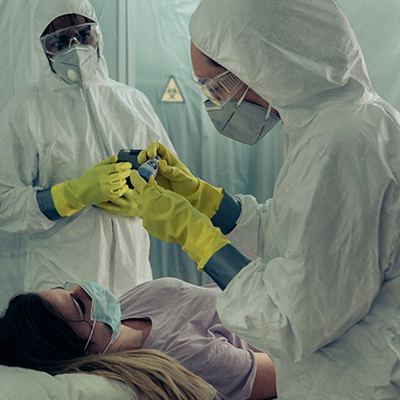Military hospitals have existed since the Roman Empire, but the modern concept of a field hospital (i.e., a temporary structure serving as a mobile medical unit that takes care of casualties on-site) has only existed since the Napoleonic Wars in Europe.
Over the decades, the term “field hospital” has evolved to include a temporary medical structure that may be used to treat injured persons in the event of a public health emergency. Emergencies could include natural disasters, such as an earthquake or flood that results in damage to facilities and multiple fatalities, or a disease outbreak that results in shortages of hospital space and medical equipment (thus straining the health system, like the recent COVID-19 pandemic).
Let’s look at exactly what a field hospital does and the reasons why they may be needed.
How Does a Field Hospital Operate?
The modern field hospital, whether in a war zone or set up as an alternate care site at a local hospital or medical care facility, can be heavily customized and configured for the needs of the attending medical personnel.
Field hospitals use modular construction, which not only offers ease of assembly and setup, but also increases convenience and treatment capacity. The modules can be arranged in different configurations to deliver multiple medical services, just like most healthcare and medical facilities:
-
Triage
-
Emergency room (ER)
-
Operating room (OR)
-
Post-operative care and recovery
-
Radiology and x-ray services
-
Intensive care unit (ICU)
-
Dental care
The strength of facilities like mobile field hospitals is that they can be designed and assembled for varying scenarios and different types of terrain – for any mass casualty event. They can be small units for basic support, all the way up to installations that cover thousands of square feet and provide resources for critical care situations.
Mass Casualty vs. Mass Fatality Events
The priority for mass casualty events includes tending to the wounded survivors, whereas the priority for mass fatality events focuses on respectfully handling decedents.
Keep in mind that mass fatality incidents can also be labeled as a mass casualty if there are multiple victims, both alive and dead. Mass casualty incidents need to have emergency medical services readily available to tend to victims. Comparatively, mass fatality events require proper fatality management, which often includes the need for temporary morgues and refrigeration systems.
Situations Appropriate for Field Hospitals
Let’s take an in-depth look at the different situations where field hospitals are most commonly deployed: conflict zones, natural disasters, and disease outbreaks.
Field Hospitals in Conflict Zones
A field hospital in or near an area of active conflict is probably the first thing that comes to mind when we think about a field hospital, owing to the fact that field hospitals originally started to care for the wounded during battle.
When a soldier is wounded and requires acute care immediately, the field hospital is the best solution (since the closest inpatient facility could be hundreds of miles away in friendly territory). The United States military has extensive experience with field hospitals, from the Second World War and the Korean Conflict, continuing through the modern day with military action in Iraq and Afghanistan.
Field Hospitals and Natural Disasters
After a natural disaster, humanitarian agencies, like the Red Cross or Red Crescent, typically establish field hospitals because the local medical facilities are heavily damaged or destroyed. Not only do field hospitals take care of the initial surge of disaster victims, but they can also be in place for months (or even years) while the local health care providers get reestablished.
Field Hospitals During Disease Outbreaks
Field hospitals were extremely important throughout the COVID-19 pandemic, especially during the early days in large cities like New York, as COVID-19 cases overwhelmed hospitals and space for COVID-19 patients dwindled.
Coronavirus, however, isn’t the only illness that necessitated the use of field hospitals. Numerous outbreaks of the Ebola virus in Central African countries makes the use of field hospitals vital in order to keep those infected with Ebola isolated from the healthy population.
Field Hospitals Make A Difference
The presence of a field hospital can make a significant difference in the well-being of the lives of its patients wherever it may be deployed. With proper staffing, training and equipment, field hospitals can provide much needed medical support that would not otherwise be available in the field.
For all the equipment needed to stock a field hospital, as well as a full range of disaster preparedness solutions, connect with Penn Care. We’ve got the best selection of equipment, supplies, and materials to make sure that your community or jurisdiction isn’t left behind.



